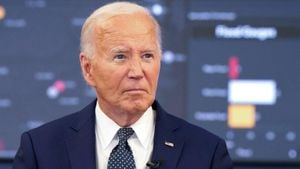North Carolina's political scene is buzzing louder than ever as the 2024 elections approach, with Democrats finding significant victories down the ballot even as they faced challenges at the top tier. This phenomenon has both political analysts and voters raising eyebrows, particularly since presidential candidates like Donald Trump and Kamala Harris were so focused on this swing state.
The recent election saw Trump clinch North Carolina with more than 3% of the vote over Harris, yet it was the Democratic party who celebrated successes elsewhere. Josh Stein’s win for governor by nearly 15 percentage points opened new possibilities for Democrats, as they wrestled control of key races including attorney general and various legislative seats. This paints a complex picture of North Carolina as it remains split between red and blue, with conservatives having dominated the state's general assembly and judiciary for some time.
According to political science expert Christopher Cooper, the overly concentrated blue support within urban areas juxtaposed with strong red momentum in the more rural and 'countrypolitan' counties is what creates confusion over North Carolina's political identity. "It's confusing to look at politically, and that's exactly what makes it purple, messy and confusing," stated Cooper, emphasizing the state's unique position. Despite the recent moves by Democrats, experts like Mac McCorkle highlight historical trends with concern, noting the improbability of North Carolina turning blue only based on recent performances.
While Democrats continue to sweep gubernatorial races, their struggle to flip the presidential narrative remains stark. The latest elections indicate the significant demographic shifts influencing political leanings, especially with the arrival of new residents, creating fluctuated voting patterns. McCorkle has continually held optimism, stating the party's successes indicate future opportunities. Yet this sentiment clashes with the consensus among analysts who foresee little chance for North Carolina’s electorate to sway toward blue in upcoming presidential contests.
One interesting insight reveals how deep the division runs statewide. Democrats appear to have considerable mobilization within urban centers like Mecklenburg and Wake counties, yet this is countered by heavy resistance from exurban neighboring counties where support for Trump remains firm. These areas, according to McCorkle, reflect traditional Republican ideals, complicatinbg Democrats’ strategies for winning over the state as they prepare for 2028.
"We cannot rely on the same strategies used elsewhere,” McCorkle cautioned. The urgency to connect with specific groups, aptly labeled 'country-politan' voters by McCorkle, is growing as these voters are often overlooked during election cycles. Residents of places like Gaston County, which is largely Republican, showed slight movement toward Democrats owing to their ground game efforts during the last election. While the margin had shrunk slightly from 2020, the struggle to capture hearts and votes remains evident. David Wilson Brown of the county's Democratic party voiced this sentiment, noting the historical neglect of exurban communities by his party.
Brown pointed out significant concerns among residents revolving around economic opportunity for their children. "Many have to leave their rural counties to pursue work and success. The GOP economic policies they support seem to have negatively affected their prospects," he explained. Notably, with the Democratic party catching on to the specific needs of these demographics, the future could still hold promise, albeit due to years of unmet communication efforts.
With the lessons from the recent elections, the North Carolina Democratic party appears to be reevaluing strategies, particularly with the new chair Anderson Clayton emphasizing the importance of reaching out to rural and exurban voters more effectively. The idea of changing narratives and connecting with traditionally less supportive areas will be integral if Democrats aim to bridge the gap toward their aspirations.
Analysts agree on the distinct approach needed to confront North Carolina’s intricacies. This is not just about bigger voter drives or campaign tactics but about establishing trust and communication with communities often left behind. Democratic candidates need to empathize with the individual values of 'country-polites' or risk staying on the sidelines as Republicans capitalize effortlessly on longstanding allegiances. The road to success may be long, but the recent victories down the ballot keep the flame of hope alive for North Carolinians wishing for more balanced universal representation.
With the presidential race behind them, the focus now shifts to potential strategies as the state gears up for the next round of elections. The engagements seen during this past election season combined with the electoral dynamics create fertile ground for analyses, predictions, and preparations for the ever-evolving political game we’ve come to expect from North Carolina.



